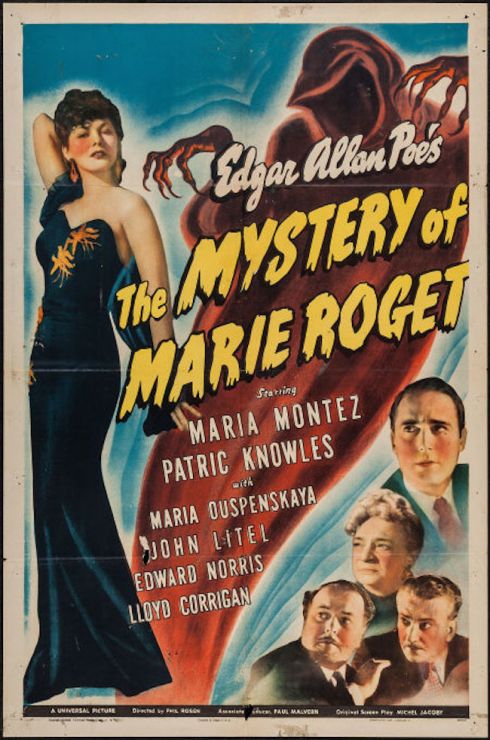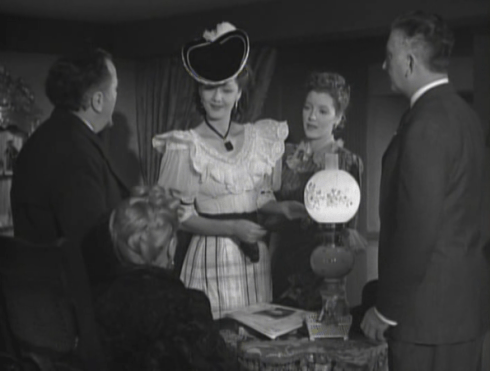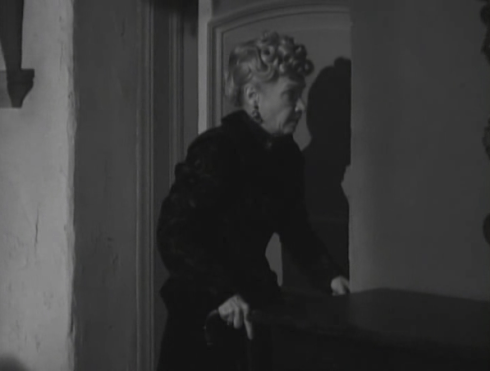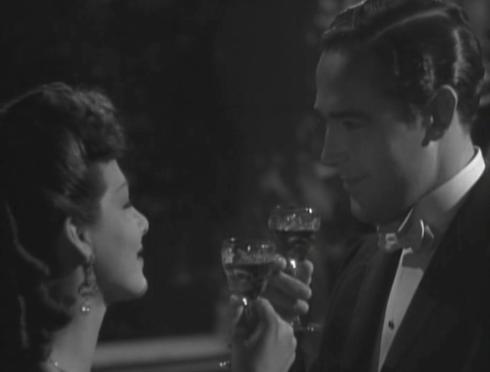This post is celebrating Hollywood’s Hispanic Heritage Blogathon hosted by Once Upon a Screen on Oct. 12, 2015
“When I look at myself, I am so beautiful… I scream with joy!”-Maria Montez
The Queen of Technicolor!…. Â Maria Montez!
"You must always act as if you are the most beautiful desirable woman in the world, you must always be treated like a queen and you must not let any directors intimidate you, because the public has the last word!"
BEAUTIFUL BEAST! MADDENING"¦ WITH HER SOFT CARESS! MURDERING WITH STEEL-CLAWED TERROR!
"The Mystery of Marie Rogêt" was originally published in 1842 a short story by Edgar Allan Poe, it was his first fiction story that played out like a true-detective tale about an unsolved murder that he placed in Paris rather than in New York. This was Poe’s follow up to his Murders in the Rue Morgue and follows the exploits of crime solver detective Paul Dupin. Incidentally the detective had been named Pierre Dupin in Rue Morgue 1932.
Adapted to the screen by Michael Jacoby (Doomed to Die 1940 with Boris Karloff, The Undying Monster 1942, The Face of Marble 1946).
Loosely based on an infamous story that made the headlines in New York during the 19th century, it concerns the murder of Mary Cecilia Rogers who earned the nickname “Beautiful Cigar Girl” who disappeared once, only to find out that she had run off with her sweetheart, a naval officer. The next time Marie showed up was three years later, floating in the Hudson River. Because of the notoriety Marie had become a national conversation piece for quite a while. Until the inquest, where her fiancé had committed suicide, leaving a remorseful note next to an empty bottle of poison. An unsolved mystery that still haunts New York.
This wonderfully atmospheric film is directed by Phil Rosen (The Crooked Road 1940, I Killed that Man 1941, Sidney Tolar/Chan films, Spooks Run Wild 1941 with Bela Lugosi) Patric Knowles play’s Poe’s detective Dr. Paul Dupin. Also part of the marvelous cast is the great Maria Ouspenskaya as Mme. Cecile Roget, John Litel as M. Henri Beauvais, Edward Norris as Marcel Vigneaux, Lloyd Corrigan as Prefect Gobelin, Nell O’Day as Camille Roget, Norma Drury Boleslavsky as Madame De Luc and Charles Middleton (Emperor Ming in Flash Gordon) as the zoo curator.
Patric Knowles as Paul Dupin and Lloyd Corrigan as Prefect Gobelin truly steals the show as their banter is marvelous and they succeed in playing a team of the straight man and the comic foil.
Maria Montez with her black hair as shiny as a raven's wing, the most sensual full shaped lips, and a creamy complexion Montez was considered The Reigning Queen of Technicolor in the 1940s– A Diva on and off the set. She had a single-minded professional drive and wouldn’t settle for anything less than being a star.
Peter Rubie who wrote Hispanics in Hollywood claims that the beauty of the Dominican Republic- Montez learned English by reading magazines and listening to American pop songs. After her short-term marriage in 1939, she dumped her husband left for New York and decided to become a model. Creating an incredible wardrobe for herself and hiring several maids to keep up with her trousseau.
She'd go out at night with her dazzling wardrobe flirting and flitting about at all the ‘in’ places to dine and dance, until a talent agent from RKO saw her and signed her. Later on Universal saw the screen test she made and they scooped her up with a better offer.
Montez arrived in Hollywood in the summer of 1940 and started working on becoming a star"¦.
Maria Montez in Sirens of Atlantis (1949).
Universal could promote her easily because the camera loved her. They did these promotional stills of her. She was so sensational to photograph and had a presence that just leaped off the page.
She was loaned out to 20th Century Fox to be in a film with Carmine Miranda, Don Ameche, and Alice Fay called That Night In Rio 1941

Though she was only in the film for less than a minute, LIFE magazine took so many photos of her, she could not become anything but a STAR"¦.
Now about the suspense film where she plays a Parisian beauty who goes missing twice, the second time having been murdered. It’s called The Mystery of Marie Roget (1942)
A slick Universal mystery with all the eerie trappings to attract the horror trade. "Who is the Phantom Mangler of Paris?
This is an effective Universal chiller, though a "˜B' movie in the ranks, what elevates it to a higher level of macabre deliciousness isn't just that it's based on a Poe short story, the means by which the murderer mutilates his victim's faces is rather horrible and grotesque for the time period it was released. One could see sparks of competition with RKO's master teller of chilling tales, Val Lewton due to its device of using a real leopard, i.e. The Leopard Man (1943) and Cat People (1942).
Even Mme. Cecile’s (Maria Ouspenskaya ) pet Leopard might be a suspect as the murderer in this mystery chiller.
In The Mystery of Marie Roget, the killer has a fetish for using a steel claw as the murder weapon, which is how he destroys the women's faces beyond recognition. It also might remind you classic horror fans of the underrated SHE-WOLF of LONDON (1946) starring June Lockhart.
Cinematographer Elwood Bredell –Man Made Monster (1941) The Strange Case of Dr. X (1942) Christmas Holiday 1944, Phantom Lady 1944, The Killers 1946 The Unsuspected 1947 Female Jungle 1956.
MAN MADE MONSTER 1941.
The Strange Case of Dr. X (1942).
Robert Siodmak’s The Killers 1946.
In Murder in the Rue Morgue (1932) Poe’s detective Dupin is played by actor Leon Ames. Reprising the role, his name is changed to Paul Dupin as the forensic expert in this film with actor Patric Knowles ( THE WOLF MAN 1942 & FRANKENSTEIN MEETS THE WOLF MAN 1943.)
Maria Ouspenskaya has more presence in this film than in The Wolf Man 1941,
playing off the Prefect of Police's Lloyd Corrigan as Gobelin, the gesticulating police chief, whose marvelous facial expressions make for great comedic relief.
To capitalize on Montez's growing popularity she became the Universal attraction in this mystery chiller, based on Edgar Allan Poe's short follow-up to his Murders in the Rue Morgue. Montez receives star billing in the film's opening credits!
Jacoby who adapted the screenplay also imbued the story with a bit more sensationalist pulp from the original tale, adding veritable Poe-esque elements of the macabre, also using ‘B’ movie red herrings necessary to throw us and Dupin off the scent of the truth.
When the story opens in late 19th century Paris, we are thrown into the middle of the frenzy concerning the missing popular musical comedy star of Comédie Française -the beautiful Marie Roget.
A real character reading the paper with her husband laughs- "Every man knows what sort of a woman she is, I'll wager she has gone off with one of her sweethearts."
during the argument when Beauvasi threatens to have the perfect relieved of his commission.
Gobelin-"Believe me I haven't slept for the past ten days, I have every gendarme in the city on the case now what more can I do? "
Henri Beauvais (John Litel), a friend of the Roget family is in the office of Police Prefect Gobelin (Lloyd Corrigan The Manchurian Candidate 1963, It’s a Mad Mad Mad Mad World 1963 ) whose facial expressions are delightfully droll and add such great comedic relief to the dark and dreary mystery. Henri is harassing Gobelin to find Marie who has been missing for over ten days, that it is of the utmost importance.
Gobelin introduces chief medical officer Dr. Dupin to M. Henri Beauvais (John Litel) the minister of naval affairs, a very close friend of the Roget family.
Beauvais " Dupin?"¦ you had something to do with those murders in the rue morgue didn't you?"
Gobelin says- "He practically solved those murders single-handedly."
Beauvais barks- “Yes then why haven't you done something about this Marie Roget case!?"
Beauvais threatens both Gobelin and Dupin that they better solve it quickly
They are interrupted when come in an reports that a woman's body has been found floating in the river Seine at the wharf below the second bridge, believed to be Marie Roget… It has been mutilated beyond recognition as her face has been completely destroyed. "She has no face!”
Gobelin says-"Good Good Marie Roget You see we found her! I told you we would"
Beauvais "Why are you so sure it's Marie Roget?"
Dupin " Why that's easily decided Monsieur, You yourself can identify her.. will you come with us now?"
"˜Her face! (he winces) -Dupin " Steady Monsieur can you identify the body?” Beauvais-“I don't know… About the same size as Marie Roget, same shaped head and color hair." Dupin " Does it look familiar Monsieur?" He says “Yes, yes it must be she. But it has no face."
Gobelin asks "Who could have done it, Dupin?" Beauvais says it's the “work of a fiend.”
Dupin answers"¦ "Or a beast. It looks as if the face had been torn to a pulp by the claws of an animal.”
Gobelin and Dupin go to the Roget home to tell Madame Cecile who is Marie’s grandmother.

Mme Cecile Roget (Maria Ouspenskaya) is in her wheelchair feeding scraps to her pet leopard. Camille says "Oh Granny even if we heard anything definite.”
Mme Cecile "My child.. the police are doing everything possible to find your sister.
Beauvais and Gobelin enter, Camille asks if they found Marie"¦ He tells her that she must be brave. Granny Cecile says "Speak up. Where is she? Come come what have you found?"
When he tells her that unfortunately there is nothing more they can do for her granddaughter. “We found her body in the river."
Camille doesn't believe it"¦ as Beauvais tries to calm her"¦ suddenly sweeps in like a gust of dressed-up wind"¦ But Marie Roget!
sister Camille about the news, suddenly Marie Roget enters the house as lit up as a string of paper lanterns, acting as if nothing has happened. When they tell her that her disappearance has been a sensational news story and ask where she has been.
“The police found a body in the river that they thought was yours."
Cecile "Marie where in heaven's name have you been?" Camille just happens she's home, but Beauvais says she owes them an explanation. Gobelin tells her that she's had the whole city in an uproar. Cecile hands her the paper.
Marie remarks about the news headline and asks who Gobelin is- "What an awful picture of me"¦ Who is the little man?"
“Madamoiselle I happen to be the Prefect of Police" Marie "hhm how nice!"

Granny Cecile insists on knowing where she's been-"Oh Granny You too!"
Gobelin goes on that she doesn't understand he must make a full explanation to the public.

”Oh you must, well I'll explain to you. It is nobody's business where I go, what I do"¦ "

Beauvais tells him to consider the case closed. Granny Cecile says "You heard him"¦ there's no more need for the police monsieur. "
As Gobelin leaves Grandmother Cecile’s leopard growls he is comically frightened and asks "What's that?"
"A leopard, what's the matter with you! (Granny Cecile barks at him) "¦. Haven't you ever seen a leopard before?"
Beauvais remarks "It's perfectly harmless I assure you."
Gobelin shaken mumbles to himself- "Yes, of course."
Gobelin puffs on his cigar tell his clerk to file the case away, and Dupin comes in and tells him that the murderer did a thorough job. Gobelin says it's the most curious case, "A woman without a face." Dupin has different means of identification and he will not quit"¦
Gobelin also has a hunch that there's a definite connection between the mutilated body and the Roget case.

"Maybe it's too fantastic to mention but you yourself said that the claws of an animal could have done it!" Dupin answers "Yes but I said could of I didn't say did. What's on your mind?"Â "The Old Lady old Madame Roget! now there's a queer customer. She's eccentric. She's a little bit twisted I think. She's got scads of money and yet she lives in an old-fashioned house in the Latin quarter. And listen to this. She's got a pet cat. (Dupin just sits quietly calmly listening to Gobelin as if he had lobsters crawling out of his ears- Gobelin leans in -) Only it's a leopard!" Dupin remarks quizzically- "A Leopard?"

"A full-grown leopard" "That's very interesting Gobelin but it's a blind alley" "Well I"m not so sure…" Dupin tells him… " You can forget it!"

Dupin walks out of his office"¦ Gobelin still trying to talk to him, "I can, well wait.." Dupin slams the door on him"¦
Camille (Nell O'Day) is sitting in the parlor with Marcel Vigneaux (Edward Norris–They Won't Forget 1937, The Man with Two Lives 1942, Decoy 1946 ) She's telling him that she wants Marie to be the first to know of their engagement. Marcel wants to elope and surprise everyone. "But I'd have to tell Marie Marcel I've never had any secrets from her" "Well does she tell you everything?"¦ Do you know where she's been for the past ten days?"
"No, but it's been the first time she hasn't. For that matter you haven't told me where you've been yourself for nearly two weeks" She pouts"¦
Marie comes into the room, telling Camille that it's nearly 8 O' Clock and they're going to be late. Then she notices Marcel"¦ and acts happily surprised. Camille tells Marie that they are going to be married. She wishes them “all the happiness in the world," She says she will be late, then she turns and tells Camille that she forgot her purse. "Would you be an angel and get it for me" Marie walks Camille out thanks her touching her back gently then slams the door and turns around as if she were a python about to strike! "Our plans didn't include you marrying Camille!" "I don't intend to marry her. (the cad, the scoundrel) "Then why did you propose to her?"
“Now take it easy Marie don’t let your temper spoil all our plans!”
Just then Grandmother Cecile walks down the stairs with a cane in each hand. The shadow on the wall could be a frame right out of a Val Lewton shadowplay film. She overhears the two arguing. Marie threatens to tell them everything. She doesn't care if anyone hears"¦
"You're not going to change my mind!" Marcel tells her "Don't be a fool Marie" "A fool is what I'm not going to be. I won't let you marry her. I'll tell her everything. That you promised to marry me.
"Are you going to let petty jealousy ruin all our plans?" "Our plans did not include you marrying Camille. I won't let you. I won't!" " I have no intention of marrying her." "Then why did you propose to her?" the scene cuts to Cecile behind the door listening to the couple conspire. Marcel tells her "It should be very obvious to you. It's only to cover us. Who would possibly suspect me her fiance when she disappears tomorrow night can't you see!"Â
"Marcel, darling you're so clever! And I am stupid, you do love me don't you?" "Nothing can ever change that if you'll just believe in me." "Then we'll go through with our plans at the party. Once Camille is gone, we'll have everything." The two embrace. The scene cuts to Cecile who has now stumbled onto the nefarious plan to kill her other granddaughter.
Marie's half-sister Camille’s fiancé, Marcel (Edward Norris), who is on the staff of the Navy is secretly having an affair with Marie. Marie is also toying around with a flirtation but the non-committal relationship with M. Henri Beauvais (John Litel), Marcel's boss. Maria Ouspenskaya as the wonderfully crafty Cecile the grandmother overhears Marie's plan to kill Camille before she turns the age of 21. And so she hires Dupin the grave-robbing, brain-extracting forensic scientist hero to keep a close eye on Camille when she goes to Marie's welcome home party.
Gobelin goes to Dupin's lab where he has determined that the dead girl is English. "You see we are what we eat" They can consult with Scotland Yard"¦.
He also decides that Gobelin might be right that there is a connection between the dead girl and the Roget case. He decides to work on the case unofficially even if the case has been closed. He's working on a few angles. Dupin asked Gobelin to arrange for him to meet Marie Roget. Since there's a party given in her honor that night he will go. Then a gendarme brings a message for Dupin.
"My dear Dr Dupin it is imperative that you see me immediately. Do not waste time it is a matter of the utmost importance. You'll come alone and at once”–Signed Madame Cecile Roget"¦"
Dupin and Gobelin arrive at Mme. Cecile’s home-Elwood Bredell’s photography creates street scenes that are set up like wonderful postcards.
“Exactly what is her relationship to Marie?" "The grandmother," Dupin asks him to come along, and jokes that Gobelin is afraid of the pet cat"¦ "I'm very fond of animals really, but it's not so little really."
Madame Cecile tells Dupin that she made it clear she wanted to see him alone. He apologizes but Gobelin is his most trusted friend.
"Trusted friend my foot there's no such animal" She wanted to avoid policemen. She invites them to sit down. There is something she wants him to do. Then she barks at Gobelin. "Well why don't you sit down" It's hilarious how she bullies the poor Prefect as if he were a little boy being scolded.
“And it's worth fifty thousand francs"Â "Well that's quite a sum of money Madame," Gobelin says. She replies, "You keep out of this!"
"I don't believe I'd be interested in that sort of money Madame" but she tells him that's all anyone is interested in"¦ money. She will give Dupin fifty thousand francs to escort her granddaughter Camille to Madame De Luc’s party given for Marie that night.
When Dupin asks why she is having her granddaughter escorted in such a curious manner Mme Cecile tells him "I happened to know that she is going to be murdered tonight!"¦ And I want you to prevent it" Gobelin says "Madame"¦ do you know what you're saying?" "Of course I know you fool and I don't want any police notoriety about it!"¦ Do you hear?"
Dupin asks. "Why did you select me, Madame?" "For your work on the Murders of the Rue Morgue"¦ my memory's even sharper than my ears" "Your ears then you heard something?" Gobelin asks. "That's none of your business. I am speaking to Dr Dupin as a private individual and not as a member of your fine police department" She says sarcastically.
"Madame"¦ I have the honor of being the Prefect of Police!

"Go have yourself stuffed!" Cecile says with audacity!
Gobelin asks how she knows Camille is to be murdered tonight.
" let me remind you that this is no concern of yours," Dupin tells her. "In that case madame I'm afraid I can't do as you ask." "You're not fooling me. Do you want to know what she is to be murdered? She comes into her grandfather's fortune tomorrow"¦ it's better than a million and a half francs. Now do you see?" Gobelin ires her once again by asking who benefits from her death. She reprimands him once again, "Don't ask me fool questions." Gobelin finds it hard to believe that if Cecile suspects Camille to be murdered at Madame De Luc’s party why she'd let her go?
"Who cares what you believe? That's why you're nothing more than a gendarme" He looks offended again. His facial expressions of stupefied are very effective in the midst of the serious suspense melodrama. He rises to defend himself.
Dupin understands Cecile's logic. That if an attempt on Camille's life the party would be the logical time to try and catch the killer before they try it again …
Dupin asks. "I trust you don't allow your little pet to roam the streets at night Madame?" "Certainly not, she's never out of my sight"
Gobelin comments that those claws are dangerous. Cecile acts curious as to what he is talking about but changes the subject and asks Dupin, why he's not interested in earning fifty thousand francs. But then…
Camille comes into the room. Granny Cecile introduces her to Dr. Dupin. “You were saying, Dupin?" "I was saying Madame that it would be indeed a pleasure" after he sees the beautiful Camille"¦
Madame De Luc (Norma Drury Boleslavsky-Stage Door 1937, That Hamilton Woman 1941) is furious about having to give a party for"”"Making me the talk of all my friends"¦ giving a party for that notorious creature, bringing her into her own home!" "But it's business my new show's a big hit thanks to her"¦ She's sensational, every man in Paris is interested in her."Â Madame De Luc "That's just what I'm afraid of…"
Beauvais meets Marie out on the terrace, longing for her attentions he jokes that he could send Marcel to Indochina for a year. "He's nothing to me, it's Camille he's going to marry"¦ they can have a honeymoon in China for all of me."
"Whom do you think you're fooling"¦ You know you once gave me to understanding"¦ " she interrupts him"¦ "Oh you take everything so seriously" "And you never do" "I could make you very happy I could give you everything"¦ won't you reconsider?" She laughs at him"¦ "Henri you're a dear and I love you but let's go in before you overwhelm me."
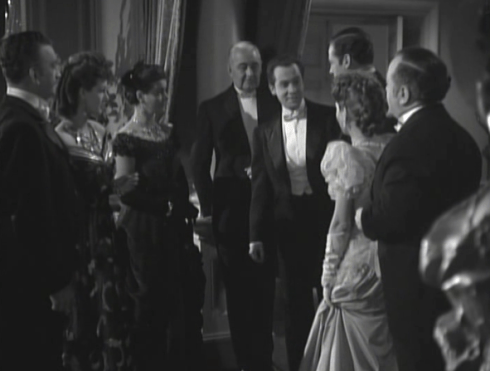
Inside Camille shows up with Gobelin and Dupin. Marie reprimands her "Camille what kept you?" The host Madame De Luc introduces Dupin to Marie Roget and Beauvais whom he met at the Prefect's office earlier.
Then Marcel walks in and apologizes to Camille for being late. Marie says "Have you met the famous Dr. Dupin?" Montez looks exquisite in her Vera West gown and beautiful jewelry. Marcel compliments Dupin on his success with the murders in the Rue Morgue. Marie shoots a knowing look at Marcel. Then Marcel asks Marie to dance, and Dupin asks Camille. A waltz is playing.

"What are the police doing here" "I wish I knew" "We can't go on with our plans it's too dangerous" "We'll never get a better chance than this" "We'll go through with our plans despite this"
Dupin is dancing with Camille there is an obvious chemistry between the two"¦


Once they stop waltzing, Marcel takes Camille to get a drink and Marie asks Dupin out onto the terrace. "You know there's something very mysterious about you. Very becoming too."

"Every woman is mysterious until the man marries her," " It isn't just any woman who creates a sensation just when she disappears and returns mysteriously as you did" "Is that an official inquiry monsieur?" "Oh no I didn't mean it that way." Marie gets angry and turns away from him"¦ "Please I don't wish to discuss it any further."
"She we drink to a mutual understanding and a lasting friendship?" he raises his glass.
Marie is asked to sing one of her new songs.
As she is escorted off the terrace a phantom hand reaches up and puts something into both glasses, while Dupin has his back turned. But Gobelin rushes out to ask him about his impression of her. He tells him it's too early to classify her yet. Then he notices that both glasses have been taken away by the same mysterious hand. Dupin asks where Camille is"¦
" There she is. I told you nothing would happen to her. That old lady was talking a lot of nonsense, you know she oughta to be in an asylum where she belongs, I mean it."

The orchestra begins to play"¦ Marie is ready to entertain the party"¦ She begins singing (overdubbed by Dorothy Triden singing ‘Mama Dit Moi’ written by Everett Carter and Milton Rosen).


Marcel is worried that the old lady found out, he's concerned about Dupin being there as Camille's bodyguard. Marie thinks it's impossible that the old lady had found out about their plans "Oh you're just making a mountain out of a molehill, why don't you just say you don't want to go through with it" "Oh don't be silly" "It would only take a few minutes after you get her out here"¦ delivery is so near, it could look like an accident" "Yes, maybe the police being here is just what we need, we'll do it under their very noses" "You know Marie, sometimes you're very clever."

A strange set of gripping hands grab Marie’s neck.. she screams.

Dupin is out on the balcony when Gobelin tells him that it's nearly midnight and they should be taking Camille home. First Dupin wants to smoke a cigar and offers him one"¦ Marie smiles and begins to walk toward Dupin when a pair of hands reach out of the brush and pulls her in"¦ she screams.
Dupin and Gobelin react instantly! He runs into the house, and sees that Camille is perfectly safe talking with Madame De Luc -Gobelin tells Dupin that the scream came from the garden and points in that direction. It’s a fabulous noir shot. Dupin discovers Marie Roget's purse. Gobelin goes back into the house looking for Marie and meets Madame De Luc. who tells him that she went into the garden the last time she saw her. "She's a sort of an illusive sort the men tell me."
Dupin continues to search the garden and finds Marie's scarf"¦
Beauvais wants to take charge of the body. But Dupin hasn't finished his examination.
A couple in the street are reading the headlines"¦ "Marie Roget is missing for the second time" "What do you suppose she's up to" "That my lady is what the police would like to know"
Another body is fished out of the Seine. Gobelin exclaims "My goodness Dupin this one doesn't have a face either!"
In a twist, Marie not Camille once again disappears during the party and is found as the other body had been, floating in the Seine with her face mutilated. By modern standards of criminal psychology, I would say it was not only a case of personal, overkill, it has everything to do with obliterating her identity as a way of demeaning her beauty. But for this 1942 film’s purpose, her face was smashed to a pulp… And I’m not spilling the beans about why.
Mme. Ouspenskaya who has the pet leopard in the film had said that she loved all animals. They could see she was not afraid of the big cat. Though she appeared so vulnerable in her wheelchair, it was the rest of the crew who always looked worried.
The wonderful music is composed by Hans J. Salter and the spectacularly mesmerizing allure of Montez adds another layer of flamboyant mystique as she flits around in Vera West gowns"¦!
The film is just around an hour long, and the sensual Montez is brought in to give her a desirable appearance, though it may not count as a leading role, her presence adds the right seductiveness to the plot.
What we do come to learn is that Marie is considered a wicked woman. Dupin (Knowles) uncovers and becomes the judge of her character. As a forensic scientist, he ghoulishly extracts her brain in the morgue to study it at lengths, which invokes the profane ideals of Frankenstein 1931. He announces that the lady had a twisted criminal mind… Dupin has no desire to resurrect the dead woman as did Henry Frankenstein, he merely aspires to understand the workings of the criminal brain. But it’s still a creepy passion…
Whatever the truth, The Mystery of Marie Roget is an easy surrender to an hour, a nifty little programmer that uses Maria Montez's aloof sensuality perfectly in the role of the missing/found/missing/murdered girl.
It would have been my wish to have had time to do a companion post to this one in tribute to the Hispanic Heritage Month Blogathon… by paying tribute to yet another sensually volcanic actress Lupe Vélez who terrorized poor Virginia Bruce in the ‘B’ chiller Kongo 1932!
It’s no mystery gang, I’ll always be your everlovin’ MonsterGirl



